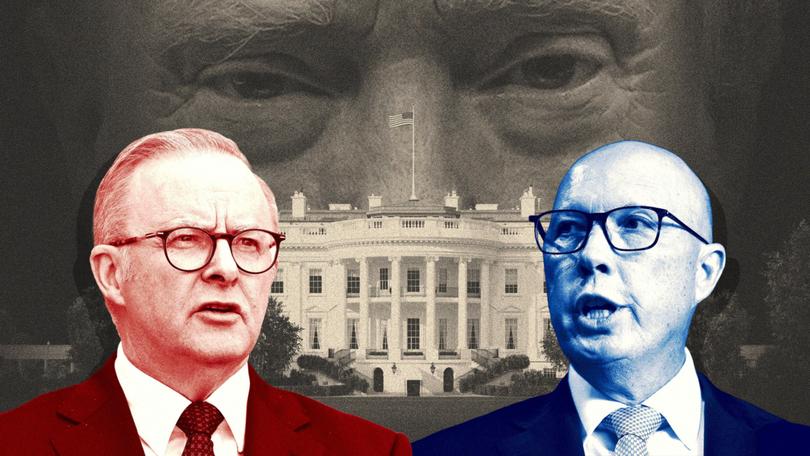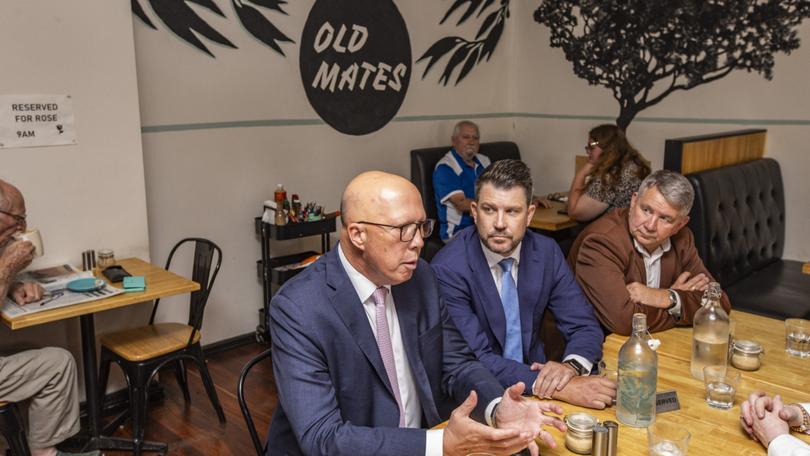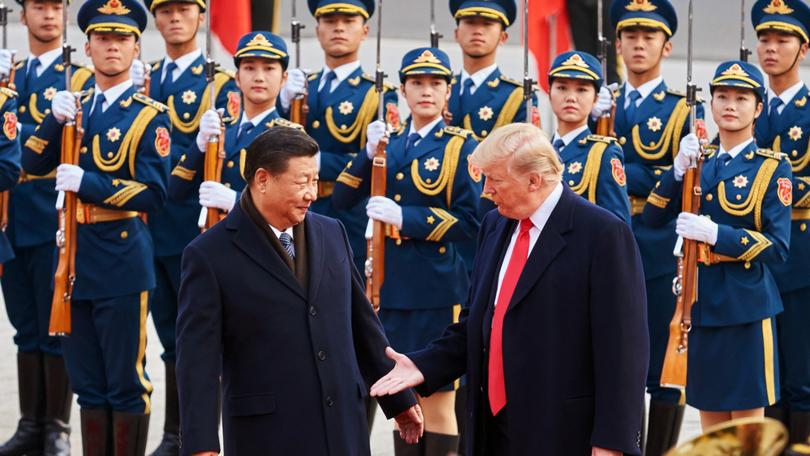NICOLA SMITH: Chinese tests, Trump trade talks and an election —Do perceptions matter?
NICOLA SMITH: With US trade negotiations and China’s military activity in the spotlight, could perceptions of strength or weakness determine the outcome of an election?

The lingering presence of a Chinese naval group conducting live-fire exercises near the Australian coastline has fed an Opposition narrative of Labor weakness on foreign policy.
But the perception of Coalition strength does not necessarily reflect geopolitical realities, and while foreign policy issues help shape, rather than define, the election environment, it’s a strategy that could ultimately backfire, say analysts.
“I think they’ve [China] worked out that he’s a weak Prime Minister, and they’re testing him,” charged shadow defence minister Andrew Hastie on Wednesday ahead of Senate estimates dominated by the revelation the defence ministry was informed about China’s military drills by a Virgin Australia pilot.
Sign up to The Nightly's newsletters.
Get the first look at the digital newspaper, curated daily stories and breaking headlines delivered to your inbox.
By continuing you agree to our Terms and Privacy Policy.Alarm about China’s unprecedented naval sortie in Australia’s backyard coincides with a new Resolve Strategic poll showing voters prefer Opposition Leader Peter Dutton over Prime Minister Anthony Albanese by 34 to 18 per cent when asked who could best deal with US President Donald Trump.
A December Freshwater Strategy survey produced similar findings, with 47 to 36 per cent saying Mr Dutton would be better placed to negotiate with the US leader than Mr Albanese.
Why is Peter Dutton perceived as stronger?
”Dutton is very much more of a classic strong leader if you were to place him in leadership archetypes,” said Leo Shanahan, Freshwater Strategy’s director.
The politics of the US-Australia relationship was also “self-evident,” he said, adding that Labor had to make up ground from previous disparaging remarks from Ambassador to the US, Kevin Rudd.

The Coalition already had form in steering Australia free from punishing tariffs under the last Trump administration, he argued.
“I think that the track record also speaks to a Coalition government being able to negotiate with the Trump administration. That’s not to say Labor couldn’t do it. It’s just that it is going to be harder.”
Prof. Mark Kenny, director of the ANU’s Australian Studies Institute, said Mr Dutton’s “tough, ex-cop” image fed into the public’s idea that he would be more competent in dealing with a Trump White House and played into his portrayal of the PM as an indecisive leader.
“I think that’s the conclusion people are arriving at. Whether it’s correct or not, it doesn’t matter,” he said.
Could the Coalition’s foreign policy brand backfire?
But public view of the Coalition’s relationship with the US President may not work in the Opposition’s favour, argued Professor Kenny.
In a time of global instability, Mr Dutton’s leadership on foreign policy would be another “unknown factor,” he said.
The Opposition leader’s assumed assertiveness with Mr Trump was not guaranteed.
“Because he’s a fellow conservative, would he become a lickspittle of the US in ways that a Labor government might be less inclined to do?” he said
“The truth is, Australian policy in relation to the US, is incredibly submissive already.
“And having a fellow conservative in Australia may actually expose us to an even closer relationship with a increasingly unreliable security partner guarantor.”
In reality, there was already a high degree of bipartisanship in Australian defence policy whether in relation to China and the US, Mr Kenny said.
“There may be rhetorical differences in the framing of things, but essentially, we’re talking about most likely the continuation of the same ongoing, fairly submissive relationship that Australia has with the US.”
How would the next government handle the Trump administration?
Arthur Sinodinos, the Ambassador to US between February 2020 and March 2023, said any future Australian government would need to recalibrate its approach to the US.
“It can’t be from the point of view of just responding to whatever the Trump administration is doing,” he said. “What are the buttons to push to get what they want?”
The theory of a Coalition “ideological affinity” with the Trump administration may not hold.
“This is not a traditional Republican administration and Peter Dutton is not a Trumper, he’s a fairly pragmatic conservative,” he said.
Any Australian leader would need to handle Washington’s more transactional nature, even with allies.
“The idea that America does not see itself these days as the underwriter of the global system, and in some ways behaving more like just another great power with a more narrowly defined set of interests. That’s a challenge any Australian government would face.”
Will foreign policy even be an election factor?
In an election centred on the cost-of-living crisis, the impact of foreign policy on the campaign would likely be “environmental,” he said.
“I don’t know that it’ll become an election issue per se, but it may influence people’s perceptions of leaders.”
The ANU’s Mark Kenny said foreign policy could feed into the framing of domestic priorities, and the “general sense of instability and disruption” on the international stage that psychologically could impact the election.
Greater instability abroad could lead to a less adventurous approach to politics and political choices “and a reluctance to turn from a competent government and foreign minister,” he said.
On the other hand, voters may be tempted to choose a conservative politician more in tune with the Zeitgeist of “more muscular” right-wing positioning.
Washington’s decision in March on whether to exclude Australia from punishing steel and aluminium tariffs could also have implications for jobs and growth, said Mr Kenny.

Leo Shanahan said that while Freshwater polls showed national security was only a concern among 11 per cent of the population, management of the economy and cost and standard of living were all linked to larger economic forces.
“How you deal with the likes of Donald Trump would play into that broader economic management issue. So, managing the economy it’s very much a Coalition equity as well.”
Geopolitical factors could not be ruled out of the election equation, said Mr Shanahan.
“You see the front page today, China engaging in military exercises near Australia. So, if that continues, I think it would be an issue in the campaign,” he said.
“In contemporary Australia, key foreign policy issues are always who deals best with China and who best deals with the US. The US has often been a given, but with Donald Trump it no longer is, and that’s a complicating factor.”

